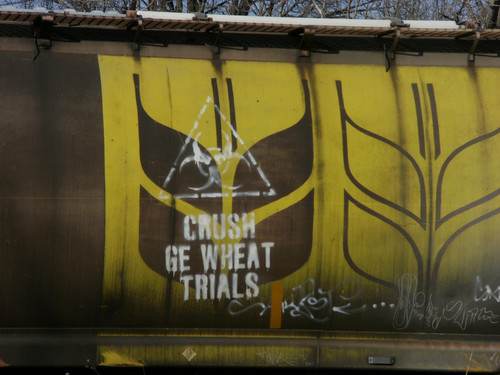
photo
Bacteriophages are viruses that attack bacteria. They have been compared to “space ships that are able to carry genetic material between susceptible cells and then reproduce in those cells” (Kutter, 1997). Bacteriophages are, in fact, very simple organisms that consist of genetic material (DNA or RNA) surrounded by a protein coat, a hollow protein tail and tail fibers". source
" ... recent advances in molecular biology have also allowed for the development of novel phage-derived antimicrobial agents, such as lysins and non-replicative phage-based lethal agents. Much of the research and development of these technologies has been conducted on a small scale, resulting in numerous peer-reviewed publications and patents, but very few commercially available products to date. While the data available on many of these phage-based antimicrobials appears promising on a laboratory or pilot scale, their true efficacy will be explicitly realized once these technologies enter into broad clinical or commercial availability". here
There true "efficacy" may well be "realized", now that this experiment is being conducted in the societial lab with commercial release of several products and this link which also discusses the lack of testing and probable dangers.
.
Interesting note Bacteriophages "are very useful nano-structure tools".
Phages are also being used to produce nanowires: sensors and chips because of the "excellent template" of phages and their ability to self-replicate rapidly. For a startling article of the advances and commercial releases of novel phages and nanotechnology applications see the PDF Biotechnological Exploit of Bacteriophage Research
A leader in the technology: Wageningen, Food Valley Netherlands:
"Convergence of micro systems, fluidics, functional molecular cell design, and supra-molecular chemistry now brings all food size structures within reach, says Dr. Frans Kampers, director of BioNT (www.biont.wur.nl), the Wageningen, Netherlands-based research center focused on the fundamental science and technology of micro- and nanosystems and their applications in food and health. Kampers is the center’s strategic research coordinator in bio-nanotechnology. His remit encompasses quality assurance through sensing and diagnostics, food design, safety monitoring and control, innovative processing, encapsulation and delivery, and packaging and logistics.
The center’s location in Wageningen is no accident. This area aims to become to the food industry what San Jose, Calif., area is to the semiconductor industry. It’s even referred to as Food Valley (www.foodvalley.nl/english/default.aspx).
EBI Food Safety (www.ebifoodsafety.com), also in Wageningen, has developed the first commercial bacteriophage product, ListexTM, which targets Listeria monocytogenes-pathogenics with a 30% mortality rate. ListexTM was granted the U.S. FDA-GRAS (generally regarded as safe) approval in October 2006; organic EU approval in June 2007, and an extension of GRAS approval from the FDA and USDA for use with all food products susceptible to Listeria" read more



5 comments:
I understand all this because I use to teach biology. This may lead to the cure for cancer and a new host of other not so attractive findings. If they can go in and reteach the genetic code to fix itself then you have the cure for cancer. As always, there is a little good with the bad.
Actually as far as technologies go, this is a pretty old one. It was around in the Soviet times, and you can still travel to a clinic in the former USSR (Kiev I think?), and another one in Mexico I think, and get phage treatment for bacterial infections. We just haven't used it much in the west.
I had heard of the Listeria, but didn't know it was Dutch.
Honestly, I'm pretty unimpressed with 'Food Valley'. The website looks pretty empty so far too, both in English and Dutch. I had never heard of it before, and I saw something like it with computer technologies during the IT boom when the Dutch government tried to create a Silicon Valley here. I even contacted them with the initial ideas of a business proposal.
Honestly the Dutch don't have a lot of skill in managing something like this, and if it goes like the Silicon Valley project went, there won't be anything for anyone to worry about.
The basic idea is to get venture capitalists to invest in ideas people step forward with, with the Dutch government also participating as a partner. I suspect there will be a lot of money thrown around, without many good ideas emerging as a result.
I suppose we could go there with our own ideas. Have any ideas to make us rich in the world of food?
I'm sure you're right..there probably are valuable applications of bionanotech. One untenable problem is the involvement of industry/business in the review of these organisms and the military as a driver of it. There is a clear conflict of interest: the concern with nanotech proponents is that regulation will disuade investors and weaken the ability of nations to compete in global markets. Most Governments and business recognize the transformative nature of nanotech: for food, miltary, industry, etc If regulations slow down innovations, its not surprising Governments are lagging. If people really examined the potential hazards and applications, I believe they would demand immediate action.
Hi Patrick,
Eastern Europe and Russia have used phages for a long time as antibacterials. But the application of biotech and nanotech is a new phenomenon.
I think the goings on in Wageningen deserve a bit of scutiny.
Patrick,
This doesn't seem like a minor investment to me:
"Employing 15,000 people in food/agro science, the Netherlands’ “Food Valley” hosts more than 1,440 food-related companies, 70 food-sciences companies, and 21 food/agro research institutes. Major food companies include Heinz, Campina, Smithfield, Unilever, CP Kelco, Nestle, Sobel, Mead Johnson, Masterfoods, Heineken, Givaudan, Grolsch, Monsanto, Abbott Laboratories, Nippon Suisan, Numico Research, and Royal Friesland Food.
Some of the funding for NanoNed (www.nanoned.nl) has facilitated development in Food Valley. NanoNed is a Dutch national nanotechnology R&D initiative-and partnership with Philips-that brings together nano efforts with relevant scientific, economic, and social research and infrastructure projects. It is a combination of disparate groups (advisory board members source from FEI, Solvay Pharmaceuticals, DSM Research BV, Shell Global Solutions, IMEC, Bronkhorst High Tech BV, Akzo Nobel Central Research BV C2v, ASML Netherlands BV, Philips Research, Friesland Foods, and Unilever), and it is organized into 11 discipline groups: Advanced Nanoprobing, Bottom-up Nano Electronics, Chemistry and Physics of Individual Molecules, BioNanoSystems, Nano Electronic Materials, Nano Fabrication, Nano Fluidics, Nano Instrumentation, Nano Photonics, Nano Spintronics, and Quantum Computation. Altogether approximately 200 research projects have been defined.
NanoNed launched NanoLab NL as a national nanotechnology facility. NanoLab NL combines the existing facilities of Twente, Delft, and Groningen, carrying out a targeted, five-year, €80 million reinvestment as part of the NanoNed initiative. The first €18 million phase of this program had begun under the Nanoimpulse initiative, a Dutch Ministry of Economic Affairs technology program that provides funding for nano R&D. NanoLab NL coordinates the use of the facilities, tariffs, investments, and the cooperation with industry, and places a special emphasis on small and medium-sized high-tech enterprises.
The Netherlands’ nano-food pursuit is backed by a very strong technology foundation, and the result is a most unusual synergy that influences developments in food. For instance, Belgium-based IMEC established the Holst Centre (www.holstcen tre.com) in Eindhoven and runs “wireless autonomous transducer solutions” activities through Stichting IMEC Nederland (www.imec-nl.nl) there that impact the food industry (e.g., RFID tagging of cattle for milk production). Also in the center, the Netherlands’ independent R&D organization TNO runs the “system-in-foil products and production” (printing electronics on thin substrates) activities that has application to food packaging. "
http://www.smalltimes.com/articles/article_display.cfm?Section=ARTCL&C=Speci &ARTICLE_ID=312018&KEYWORDS=netherlands&p=109
Post a Comment